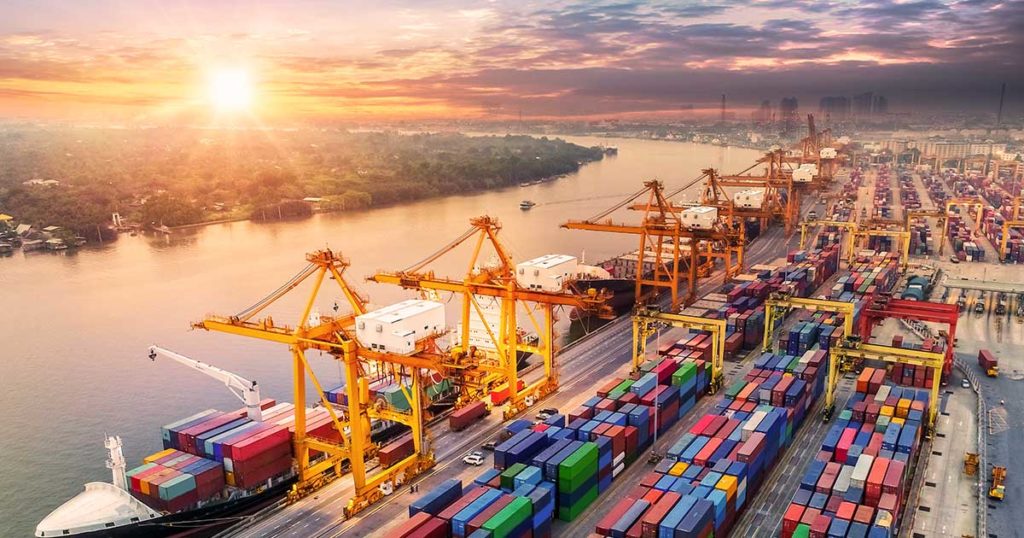In our blog series announcing the Speed – Smart Port Ecosystem manifesto, we are interviewing stakeholders of ‘smart’ ports. This week, we talked with Cyril Chedot, Head of Land use planning Department at Port of Le Havre.
The inquiries we had with port stakeholders show that new technological solutions implemented in Smart Port Ecosystems have the following requirements: a significant amount of data is shared, the right data is pick-up up at the right moment and all stakeholders should benefit from the optimization work set by the algorithms to process the data. Yet, there are some burdens in this process. The data that is used in new solutions is owned by multiple parties, the online tools that visualize this data are managed by parties that port stakeholders do not enter in contractual agreements with and the algorithms that process this data are developed in offshore settings. These issues open the discussion on trust when global solutions are introduced to Smart Port Ecosystem stakeholders. Unfortunately, there is no general solution to address them. However, the solutions implemented in Smart Port Ecosystems should all be characterized by trust. The approach taken to build trust at the Port of Le Havre is explained by Cyril Chedot, Head of Land use planning Department at Port of Le Havre.
What are contemporary trends in implementing technologies at the Port of Le Havre?
The port of Le Havre, although at a different scale of operations (from a cargo and vessels handling point of view) than ports like Antwerp, Rotterdam or Hamburg, follows the same trends in implementing technology and innovation. The port of Le Havre is among the beneficiaries of the Smart Port City project that supports the identification of new technological priorities and provides them with initial finance. The trends towards a Smart Port Ecosystem at the port of Le Havre include the following type of technical and non-technical development projects like: the implementation of 5G technology, developing an advanced cyber security program, implementing projects that are based on data science, developing projects that are linked to energy use, reducing environmental emissions and addressing social issues.
What are the barriers and drivers present at the port of Le Havre in developing a Smart Port Ecosystem?
The development and/or implementation of new technologies faces barriers that are mostly linked to the following elements:
- specific regulation for organizing public tenders
- the dogma of civil society
- the danger for taking up projects with limited added-value
Firstly, the strict centralized regulations with regard to organizing public tenders generate many difficulties for the port of Le Havre. These difficulties are mostly shown in tryouts for holding a consistent communication between the private and public institutions. The framework under which new tenders can be organized imposes strict public procurement regulations and administrative procedures. The private sector points to these procedures and claim that they take too long. The same framework of regulations applies for both relatively big projects as for small projects that are exploratory or try-outs. The latter keep small and medium technology providers players (and start-ups) away, as they cannot leverage on new technology and deliver fast solutions. Moreover, for big investment projects (and relatively big technology providers), the same regulation does not offer enough certitude and incentives to engage in initial preparatory actions for following the tendering procedures. ‘The public tenders procedures set the brakes on innovation’, says Cyril Chedot.
Secondly, the development at the port of Le Havre faces societal opposition. Ports are mostly gates towards globalization, therefore any initiative that requires green or blue fields developments face opposition. Lastly, the fear of port stakeholders for investing in technology that might not bring the expected added value keeps technology providers at distance from carrying try-outs or pilot projects. Cyril Chedot remarks that the regulations, society dogma and stakeholders’ fears are well intended, thus a general working framework characterized by trust needed to be defined.
The current main drivers towards expanding the port ecosystem are seen in the following action points. Firstly, the upcoming developments at the port of Le Havre are led by the Smart Port City roadmap that details 20 projects of a total estimated value of 240 million EUR. To complete these projects, the port of Le Havre relies on the Smart Port City project to offer a more facile environment for small companies to carry new developments. Secondly, the Port of Le Havre organizes a communication platform where citizens, representatives of the port users and universities can exchange ideas and hear each other’s vision with regard to smart port developments. The function of this communication platform is to inform society about the role of the port, change the industry’s perception about universities and generate knowledge that can lead to new solutions. Lastly, the port of Le Havre involves also academia in evaluations of projects to minimize the risk of pursuing potential technical development with limited added value.
What is still to be done at port of Le Havre to become smart?
“Despite of long lasting processes in implementing new innovation, we believe that the port of Le Havre is already a Smart Port.”
Cyril Chedot, Head of Land use planning Department at Port of Le Havre
“We believe that the port of Le Havre is already smart, the question at this moment is how to become even smarter”, says Cyril Chedot. The port authority is relying on the already in use cargo community system. This type of technology would be required to be uplifted in the nearby future. The uplifted version should make it possible for the port users to work together with new flexible solutions and be connected to satellite applications that would bring extra benefits. This is the trend that is currently taken at world leading ports in order to reduce the technological gaps.
By Valentin Carlan, Researcher



